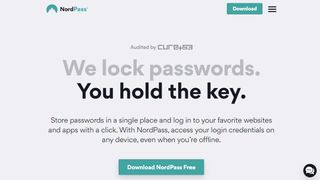This popular password manager will now tell you if your data has been compromised
NordPass will now inform you if your credentials have been leaked

Password manager NordPass has announced a security upgrade that should help users discover if any of their data has ever been leaked. Data Breach Scanner is a new tool included within NordPass Premium that scans the web to determine if an individual’s information has been stolen as part of a data breach.
When a data breach or leak occurs, sensitive information can end up being circulated, either publicly or just among cyberattackers. Often, victims may be unaware that their information has been leaked, particularly if the breached organization is also in the dark regarding the incident or simply has a poor disclosure policy.
Data Breach Scanner will display a list of websites that have suffered a data breach involving the user’s data, along with a description of how the leak occurred. A list of emails that have never been compromised will also be shown, reassuring individuals that they have not been compromised.
- The best password management software available
- The best identity theft protection solutions
- Also, check out our list of the best antivirus software
Strong credentials
“You can use NordPass’s Data Breach Scanner to scan the web and see whether your details have ever appeared in any breaches,” NordPass blogger Ruth Rawlings explained.
”You can then take action to protect your accounts and sensitive data. If your accounts were compromised, it’s advisable to at least change your passwords. If it’s any other data, such as your credit card details, monitor your bank balance for suspicious activity and, if you notice anything, contact your bank immediately.”
Data Breach Scanner will provide a handy reminder for individuals to refresh their credentials whenever they are stolen. While it may be easier to leave a leaked username or password unchanged, attackers may be formulating ways to use that information maliciously. Often, a data breach is a precursor to fraudulent activity.
NordPass has also recently launched a Password Health feature to help users identify which of their accounts are vulnerable. Although passwords remain the primary method for identifying online users, many individuals still use weak, easily guessed credentials.
Are you a pro? Subscribe to our newsletter
Sign up to the TechRadar Pro newsletter to get all the top news, opinion, features and guidance your business needs to succeed!
- Be sure to check out our list of the best endpoint protection software
Barclay has been writing about technology for a decade, starting out as a freelancer with ITProPortal covering everything from London’s start-up scene to comparisons of the best cloud storage services. After that, he spent some time as the managing editor of an online outlet focusing on cloud computing, furthering his interest in virtualization, Big Data, and the Internet of Things.

